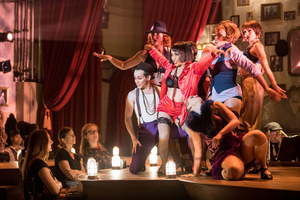Review: Immersive CHICAGO at Theater Latte Da

Theater Latte Da is justly famous locally for high quality intimate takes on the American musical. This time, they've done their best to erase all division between audience and actor, creating the feel of a 1920s speakeasy in their 240 seat proscenium space. From the moment the audience enters, there's a visible jazz combo playing, tucked into three shoulder height pits on the wooden stage, smoky air wafting around mismatched chandeliers, red velvet curtains, ranks of footlights, with all walls covered by hundreds of framed photos and mirrors. Some 30 onstage bar seats provide the sense of a club, and a short catwalk extends through the first five rows of regular seating. Aisles on both sides of the steeply raked remaining seating as well as a cross aisle at stage level allows for actors to accost and flirt with patrons throughout the show.
Before the ostensible first line, we are treated to performances of early jazz hits by three of the principal actors, all fine song stylists: Reed Sigmund, who will play Amos Hart; Robert O. Berdahl, who will play Billy Flynn; and Regina Marie Williams, who completely wraps the audience around her little finger performing "Nobody Knows You When You're Down and Out." She'll go on to nail the crucial role of Mama Morton.
Full disclosure: I don't much like CHICAGO as a show (largely because it strikes me as so deeply cynical, plus I'm not a big Fosse/Verdon fan) but I can't fault this production in the slightest. If this is your thing, you'll love it. With its inherent critique of egregious lying in order to stay in the media spotlight so as to avoid justice, it's topical, too, I'd say.
There are some powerhouse voices here, most notably Berdahl as the sleazy lawyer Flynn, Britta Ollmann as blonde bombshell and murderess Roxie Hart, and the very versatile MIchelle de Joya as her antagonist Velma Kelly. Reed gives special pathos to the hapless Amos Hart, but it's clear in "Mr. Cellophane" that he has serious pipes. Special shout out goes to Fernando Collado, who exhibits incredible control of his falsetto in the role of Mary Sunshine.
Music Director Denise Prosek is in a central pit at the piano, conducting her ensemble: Steve Grisdale on drums, Elaine Burt on trumpet, Wade Clark on trombone, and Mark D. Henderson on reeds, principally sax. They're great.
This ensemble dances up a storm, with lots of popped shoulders and thrusting hips and languid hands and high kicks, led by dance captain Joey Miller (who looks terrific in a black sequined dress, among other getups). Choreography is by Kelli Foster Ward.
Action is orchestrated by Latte Da's artistic director, Peter Rothstein, and flows and swirls beautifully across and down and around the pathways made possible by Eli Sherlock's ingenious set. Costume designer Alice Frederikson makes ample use of fishnets and hot pants, garters, sequins, fringe, pinstripes, satin, and feathers, engineering a few surprises of her own. Kudos to Mary Shabatura's lighting design, which uses follow spots and pin spots to direct our gaze and supplies plenty of the requisite razzle dazzle.
The show is a full two hours, plus a 15 minute intermission, but the pace never flags. As Rothstein points out in his director's note, CHICAGO is performed in direct address to the audience, so the in-your-face approach here is totally on point. And there are plenty of clever lyrics in the Kander & Ebb score. My favorite? "Let's all work together like the Princeton crew/When you're stroking Mama, Mama's stroking you." Dramaturg Elissa Adams has put together an excellent two page spread with relevant historical background, including famous murderesses of the 1920s, the lurid tabloid press of the time, the vaudeville stars on whom the song styles are based, and the blossoming of gay culture at the time.
So there's a lot to like here, even if, like me, you aren't particularly fond of this show. CHICAGO runs through November 3. There were no empty seats at the performance I saw. Act fast if you want to see it!
Photo credit: Dan Norman
Reader Reviews

Videos
